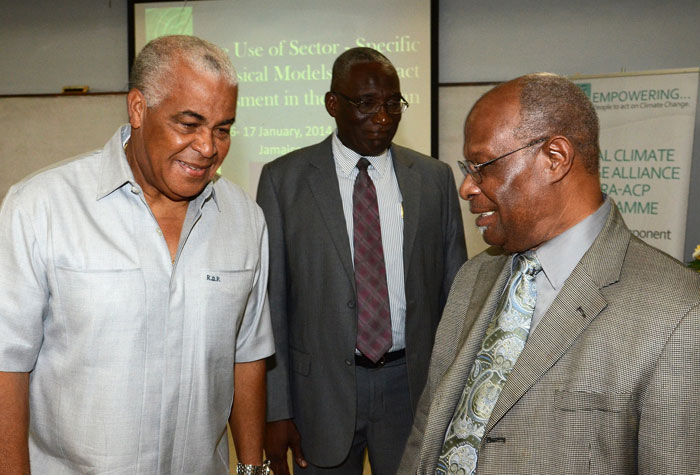Region Urged to Brace for Impact of Climate Change
By: , January 7, 2014The Key Point:
The Facts
- Climate change is one of the most important challenges to sustainable development in the Caribbean.
- By the year 2050, the loss to the mainstay tourism industry in the Caribbean as a result of climate change-related impacts could be in the region of US$900 million.
The Full Story
With the region projected to suffer billions in losses over the next several years as a result of climate change, Minister of Water, Land, Environment and Climate Change, Hon. Robert Pickersgill, says that Caribbean states must work together to boost technical expertise and infrastructure in order to address the effects of the challenge.
“As a region, we have to assist each other in every conceivable way imaginable,” he stated.
The Minister, who was speaking at the opening ceremony of a regional training workshop on climate change, at the University of the West Indies’ (UWI) Mona campus on Monday, January 6, said global climate change is one of the most important challenges to sustainable development in the Caribbean.
Citing a recent report from the Inter-governmental Panel on Climate Change (IPCC), he noted that while the contribution of Caribbean countries to greenhouse gas emissions is insignificant, the projected impacts of global climate change on the Caribbean region are expected to be devastating.
Mr. Pickersgill informed that according to experts, by the year 2050, the loss to the mainstay tourism industry in the Caribbean as a result of climate change-related impacts could be in the region of US$900 million.
In addition, climate change could cumulatively cost the region up to US$2 billion by 2053, with the fishing industry projected to lose some US$140 million as at 2015.
He pointed out that weather activity in sections of the Eastern Caribbean over the recent holiday season is a prime example of this kind of devastation.
The low pressure system, which brought heavy rain, floods and landslides to the region not only resulted in the loss of some 18 lives in the three most affected islands –
St. Vincent and the Grenadines, St. Lucia and Dominica – but also resulted in significant infrastructural damage.
Preliminary estimates of damage in St. Vincent and the Grenadines alone are in excess of US$60 million or J$6 billion.
“For a country the size of St. Vincent and the Grenadines, this loss is significant and could result in their having to revise their GDP (gross domestic product) projections. (Therefore), while one cannot place a monetary value on the loss of lives, the consequences in terms of dollar value to Small Island Developing States (SIDS) is also important,” the Minister said.
He noted that “it only takes one event to remind us of the need to become climate resilient in a region projected to be at the forefront of climate change impacts in the future”.
Mr. Pickersgill said it is his hope that the regional training workshop will, in some meaningful way, advance the Caribbean’s technical capabilities to meet the future projections head-on and be successful.
He said the workshop has particular relevance to Jamaica as one of the SIDS that is most vulnerable to climate change.
The two-week programme is being held by the Caribbean Community Climate Change Centre (CCCCC) in partnership with several regional governments, including the Government of Jamaica, and the UWI’s Physics Department, under the theme: ‘The use of sector-specific biophysical models in impact and vulnerability assessment in the Caribbean”.
The training course also forms part of the European Union (EU)-funded Global Climate Change Alliance Caribbean Support Project, which is geared towards the creation and financing of policies that can reduce the effects of climate change as well as improved climate monitoring within the region.
The Global Climate Change Alliance project is to be implemented over 42 months and will benefit Antigua and Barbuda, Bahamas, Barbados, Belize, Cuba, Dominica, Dominican Republic, Jamaica, Grenada, Guyana, Haiti, St. Kitts and Nevis, St. Lucia, St. Vincent and the Grenadines, Suriname, and Trinidad and Tobago.
Programme Manager, CCCCC, Joseph McGann informed that the project will include several activities including: enhancing national and regional institutional capacity in areas such as climate monitoring; data retrieval and the application of space-based tools for disaster risk reduction; development of climate scenarios and conducting climate impact studies using Ensemble modeling techniques; vulnerability assessments that can assist with the identification of local/national adaptation; and mitigation interventions.
For his part, Deputy Principal UWI, Mona, Professor Ishenkumba Kahwa, expressed appreciation to the Government of Jamaica for recognising the importance of climate change and giving it such a central position.

